初中英语重点句型汇总
初中英语重点句型归纳
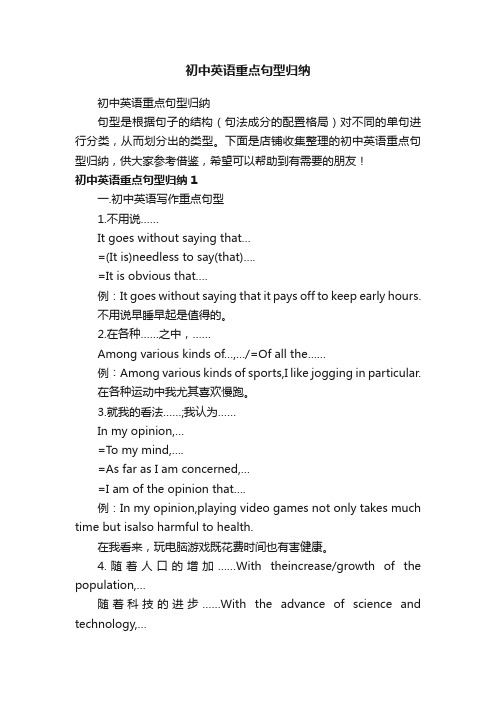
初中英语重点句型归纳初中英语重点句型归纳句型是根据句子的结构(句法成分的配置格局)对不同的单句进行分类,从而划分出的类型。
下面是店铺收集整理的初中英语重点句型归纳,供大家参考借鉴,希望可以帮助到有需要的朋友!初中英语重点句型归纳1一.初中英语写作重点句型1.不用说……It goes without saying that…=(It is)needless to say(that)….=It is obvious that….例:It goes without saying that it pays off to keep early hours.不用说早睡早起是值得的。
2.在各种……之中,……Among various kinds of…,…/=Of all the……例︰Among various kinds of sports,I like jogging in particular.在各种运动中我尤其喜欢慢跑。
3.就我的看法……;我认为……In my opinion,…=To my mind,….=As far as I am concerned,…=I am of the opinion that….例:In my opinion,playing video games not only takes much time but isalso harmful to health.在我看来,玩电脑游戏既花费时间也有害健康。
4.随着人口的增加……With theincrease/growth of the population,…随着科技的进步……With the advance of science and technology,…例:With the rapid development of Taiwan’s economy,a lot ofsocial problems have come to pass.随着台湾经济的快速发展许多社会问题产生了。
初中英语中考常考固定短语句型汇总(共80个)

中考英语常考固定短语句型1.much,a little, even, still等表示程度的副词可用来修饰比较级;而very, too, so, quite(表示身体健康的quiter除外)习惯上不用来修饰比较级。
2.arrive in +大地点/ arrive at +小地点= get to … = reach +…(到达…)We have arrived at the railway station.3.Let's +动词原形4.长,宽,高的表达法:数字+量词+形容词。
如:20 metres wide二十米宽Well 30 meters deepThis is a two-meter-high tree5.stop doing sth 停止正在做的事情Hearing the knock at the door, Dad stopped his work.6.stop to do sth停下(正在做的事情)来做另一件事Xiao Ming is tired. He stops to have a restWhen the teacher came in, the students stopped talking7.stop sb from doing sth 阻止某人干某事We should prevent/stop people from damaging the ecological environment.Dad always prevents/stops me from swimming in the river8.can't stop doing sth 情不自禁干某事Hearing this sad story, we can't help cryingHearing this joke, everyone couldn't help laughing9.There is +单数可数名词/不可数名词+ 地点状语.10.How many+复数名词+are there+介词短语?How many students are there in your class?11.remember to do sth记得将要干某事(事没做)Remember to lock the door when you leave.12.remember doing sth .记得曾经做过某事(事已做)I remember locking the door when I left.13.在季节、月份、星期、节日、球类运动、棋类游戏的名词之前不用冠词。
初中英语重点句型短语中考必背
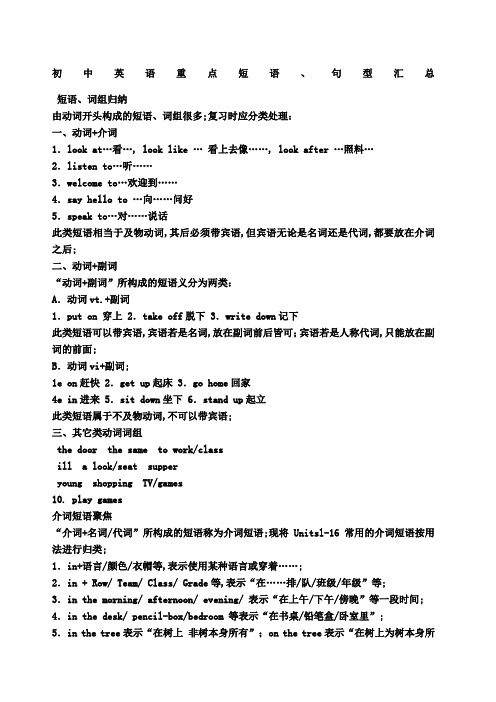
初中英语重点短语、句型汇总短语、词组归纳由动词开头构成的短语、词组很多;复习时应分类处理:一、动词+介词1.look at…看…, look like … 看上去像……, look after …照料…2.listen to…听……3.welcome to…欢迎到……4.say hello to …向……问好5.speak to…对……说话此类短语相当于及物动词,其后必须带宾语,但宾语无论是名词还是代词,都要放在介词之后;二、动词+副词“动词+副词”所构成的短语义分为两类:A.动词vt.+副词1.put on 穿上 2.take off脱下 3.write down记下此类短语可以带宾语,宾语若是名词,放在副词前后皆可;宾语若是人称代词,只能放在副词的前面;B.动词vi+副词;1e on赶快 2.get up起床 3.go home回家4e in进来 5.sit down坐下 6.stand up起立此类短语属于不及物动词,不可以带宾语;三、其它类动词词组the door the same to work/classill a look/seat supperyoung shopping TV/games10. play games介词短语聚焦“介词+名词/代词”所构成的短语称为介词短语;现将Unitsl-16常用的介词短语按用法进行归类;1.in+语言/颜色/衣帽等,表示使用某种语言或穿着……;2.in + Row/ Team/ Class/ Grade等,表示“在……排/队/班级/年级”等;3.in the morning/ afternoon/ evening/ 表示“在上午/下午/傍晚”等一段时间; 4.in the desk/ pencil-box/bedroom 等表示“在书桌/铅笔盒/卧室里”;5.in the tree表示“在树上非树本身所有”;on the tree表示“在树上为树本身所有”;6.in the wall表示“在墙上凹陷进去”;on the wall表示“在墙上指墙的表面”; 7.at work在工作/at school上学/at home在家应注意此类短语中无the;8.at + 时刻表示钟点;9.like this/that表示方式,意为“像……这/那样”;10.of短语表示所属关系;11.behind/ beside/ near/ under+ 名词等,表示方位、处所;12.from与to多表示方向,前者意为“从……”,后者意为“到……”;另外,以下这些短语也必须掌握;如:on duty, after breakfast, at night, at the door, in the middle, in the sky, on one’s bike等;重点句型大回放1.I th ink…意为“我认为……”,是对某人或某事的看法或态度的一种句型;其否定式常用I don’t think…,2.give sth. to sb./ give sb. sth. 意为“把……给……”,动词give之后可接双宾语,可用这两种句型;若指物的宾语是人称代词时,则只能用give it/ them to sb. 3.take sb./ sth. to…意为“把……送带到……”,后常接地点,也可接人; 4.One…, the other…/One is…and one is…意为“一个是……;另一个是……”,必须是两者中;5.Let sb. do sth. 意为“让某人做某事”,人后应用不带to的动词不定式,其否定式为Don’t let sb,do sth.,或Let sb. not do sth. 另外,Let’s 与Let us的含义不完全相同,前者包括听者在内,后者不包括听者在内,6.help sb. to do sth./help sb. with sth.意为“帮助某人做某事”,前者用不定式作宾补,后者用介词短语作宾补,二者可以互换.7.What about…/How about…意为“……怎么样”是用来询问或征求对方的观点、意见、看法等;about为介词,其后须接名词、代词或V-ing等形式;8.It’s time to do…/ It’s time for sth. 意为“该做……的时间了”,其中to 后须接原形动词,for后可接名词或V-ing形式;9.like to do sth./like doing sth.意为“喜欢做某事”, 前一种句型侧重具体的一次性的动作;后一种句型侧重习惯性的动作,10.ask sb.not to do sth. 意为“让某人不要做某事”,其中ask sb.后应接动词不定式,11.show sb. sth. / show sth. to do. 意为“把某物给某人看”,该句型的用法同前面第2点;12.introduce sb. to sb. 意为“把某人介绍给另一人”;introduce to sb.则是“向某人作介绍”;重点短语快速复习of 各种各样的2. either…or…或者……或者……,不是……就是……3. neither…nor…既不……也不……4. Chinese tea without, anything in it 中国清茶5. take a seat 就坐6. home cooking 家常做法7. be famous for 因……而著名8. on ones way to在……途中9. be sick/ill in hospital生病住院10. at the end of在……的尽头,在……的末尾11. wait for 等待12. in time 及时13. make one’s way to…往……艰难地走去14. just then 正在那时15. first of all 首先,第一16. go wrong 走错路17. be/get lost 迷路18. make a noise 吵闹,喧哗19. get on 上车20. get off 下车21. stand in line 站队22. waiting room 候诊室,候车室23. at the head of……在……的前头24. laugh at 嘲笑25. throw about 乱丢,抛散26. in fact 实际上27. at midnight 在半夜28. have a good time=enjoy oneself玩得愉快29. quarrel with sb. 和某人吵架30. take one’s temperature 给某人体温31. have/get a pain in…某处疼痛32. have a headache 头痛33. as soon as… 一……就……34. feel like doing sth. 想要干某事35. stop…from doing sth. 阻止……干某事36. fall asleep 入睡37. again and again再三地,反复地38. wake up 醒来,叫醒39. instead of 代替40. look over 检查41. take exercise运动42. had betternot do sth. 最好不要干某事43. at the weekend 在周末44. on time 按时45. out of从……向外46. all by oneself 独立,单独47. lots of=a lot of 许多48. no longer/more=not…any longer/more 不再49. get back 回来,取回50. sooner or later迟早51. run away 逃跑52. eat up 吃光,吃完53. run after 追赶54. take sth. with sb. 某人随身带着某物55. takegood care of…=look after…well 好好照顾,照料56. think of 考虑到,想起57. keep a diary 坚持写日记58. leave one by oneself 把某人单独留下59. harder and harder 越来越厉害60. turn on打开电灯、收音机、煤气等61. turn off 关重温重点句型1.So + be/助动词/情牵动词/主语.前面陈述的肯定情况也适于另一人物时,常用到这种倒装结构,表示“另一人物也如此;”前面陈述的否定情况也适于另一人物时,常用“Neither/ Nor + be/助动词/情态动词+主语.”这种倒装结构;注意:“So+主语+be/助动词/情态动词.”这一句型常用于表示赞同,进一步肯定对方的看法,表示“的确如此;”“是呀;”2.Turn right/left at the first/second/…crossing.这一指路的句型意为“在第一/二/……个十字路口向右/左拐;”相当于Take the first /second/…turning on theright/left.3.It takes sb.some time to do sth.此句型表示“干某事花了某人一段时间;”其中的it是形式主语,后面的动词不定式短语才是真正的主语.4.…think/find + it + adj. + to do sth.此句型中的it是形式宾语,不可用其它代词替代,形容词作宾语的补足语,后面的动词不定式短语才是真正的宾语;5.What’s wrong with…此句型相当于What’s the matter/ trouble with…后跟某物作宾语时,意为“某物出什么毛病了”后跟某人作宾语时,意为“某人怎么了”6.too…to…在so…that…复合句中,that后的句子是否定句时,常与简单句too…to…太……而不能……进行句型转换;在so…that…复合句中,that后的句子是肯定句时,常与简单句…enough to…进行句型转换.7.Sorry to hear that.全句应为I’m sorry to hear that. 意为“听到此事我很难过遗憾;”常用于对别人的不幸表示同情、遗憾之意;重点句型、词组大盘点1. She used to be a Chinese teacher. 她过去是一位汉语老师;用法 used to + 动词原形,表示过去经常性的动作或存在的状态,含有现在不再如此之意;搭配 used to do的否定式可以是usedn’t to do或didn’t use to do.比较 used to do sth. 过去常做某事;be/ get used to doing sth. 习惯于做某事;be used to do sth. 被用来做某事;2.…return it sooner or later.……迟早要将它归还;用法 lsooner or later意为“迟早”、“早晚”;2return此处用作及物动词,意为“归还”,相当于give back.拓展return还可用作不及物动词,意为“返回”,相当于go back或come back; matter what the weather is like…无论天气…… 用法no matter what 相当于whatever,其意为“无论什么”,引导状语从句; 拓展类似no matter what的表达方式还有: no matter when无论什么时候 nbsp; nbsp;nbsp;no matter where无论什么地方 no matter who无论谁 no matter how 无论怎么样 4. A young man practised speakingEnglish with Mr. Green. 一位年经人与格林先生练习讲英语; 用法practise doing sth. 表示“实践、练习做某事”; 拓展practice名词,“实践”、“实施”、“练习”;put a plan into practice实行某计划; 5. He encouraged everyone to take part in protecting our lakes, rivers, seas and oceans. 他鼓励大家参加保护我们的湖泊、河流和海洋的活动; 用法1encourage用作动词,意思是“鼓励”、“支持”; 2take part in“参加”,常表示参加活动; 3protect 是动词,表示“防御”、“保护”; 搭配1encourage sb. in sth.在某事上鼓励或支持某人 nbsp;encourage sb. to do sth.鼓励某人干某事 2protect sh. from sth.使某人不受某事侵袭或伤害 6. …to warn people about sharks in the water. ……警告人们当心水里的鲨鱼; 用法 warn用作动词,意思是“警告”、“警戒”; 搭配1warn sb.+ that从句 2warn sb. of sth. 警告某人某事 3warn sb. to do sth.告诫某人做某事 4warn sb. againstdoing sth.告诫某人当心某事/不要做某事重点句型、词组大盘点 1. She used to be a Chinese teacher. 她过去是一位汉语老师; 用法 used to + 动词原形,表示过去经常性的动作或存在的状态,含有现在不再如此之意; 搭配 used to do的否定式可以是usedn’t to do或didn’t use to do. 比较 used to do sth. 过去常做某事;be/ get used to doing sth. 习惯于做某事;be used to do sth. 被用来做某事; ……短语总结1.It’s time for sth. 该到做某事的时间了.2.It’s time to do sth.It’s time for sb. to do sth 该到某人做某事的时间了.3. 2. can’t wait to do sth. 迫不及待地要求做某事.4. 3. ask tellsb. not to do sth . 请告诉某人不做某事.5. 4. make/let sb. to do sth. 让某人做某事.6. 5. hear/see/sb. do sth 听见/看见某人做某事.7. 6. had betternot do sth 最好不做某事.8.7. It’s better to do sth最好做某事9.8. It’s best to do sth最好做某事10.9. enjoy 喜欢做某事11.10. finish 结束做某事12.11. keep 继续做某事13.12. keep on doing sth. 继续做某事14.13. carry on 继续做某事15.14. go on 继续做某事16.15. feel like 喜欢做某事17.16. stop to do sth 与stop doing sth 停下来去做某事与停止做某事.18.17. forget/remember to do 与 forget/remember doing sth.忘记/记得去做某事与忘记/记得曾经做过事.19.18. keepprecent,stopsb. from doing sth阻止/防止/阻栏栽人做某事20.19. prefer….to ……喜欢…..胜过……21.20. prefer to do sth. rather than do ath.宁愿做某事,而不原做某事.22.21. used to do sth.过去常常做某事.23.22. What’s wong with…… …..出了问题事24.23. have not hing to do with….. 与…..无关25.24. be busy doing sth . 在忙于做某事26.25. too…..to….. 太……以致知于不……27.26. so ……that ….. 如此….. 以致知于不……28.27. such…..that…… 如此….. 以致知于不……29.28. It take sb. some time to do sth .某人做某事用了一些时间.30.29. spend …..on sth.doing sth.花钱/时间做某事.31.30. pay…..f or sth.花费钱买某物.32.31. What /how about…… …….怎么样好吗33.32. would like to do sth .想要/愿意做某事..34.33. I don’t think that我认为……不…..35.34. Why not do sth. Why don’t you do sth .为什么不做某事呢36.35. What do you mean by….你….是什么意思37.36. What do you think of …..How do you like ….你认为….怎么样 37. Mikeenjoys collecting stamps . So do I.迈克喜欢集邮.我也也喜欢. 38. The more, the better . 越多越剧好. 39. Thanks for doing sth.谢谢你做了某事. 40. It is said that….. 据说……1 see 、hear 、notice 、find 、feel 、listen to 、 look at 感官动词+ doeg :I like watching monkeys jump.2 比较级 and 比较级表示越来越怎么样3 a piece of cake =easy 小菜一碟容易4 agree with sb 赞成某人5 all kinds of 各种各样 a kind of 一样6 all over the world = the whole world 整个世界7 along with 同……一道,伴随……eg : I will go along with you 我将和你一起去The students planted trees along with their teachers 学生同老师们一起种树8 As soon as 一怎么样就怎么样9 as you can see 你是知道的10 ask for ……求助向…要…直接接想要的东西 eg : ask you for my book 11 ask sb for sth 向某人什么 12 ask sb to do sth 询问某人某事 ask sb not to do 叫某人不要做某事13 at the age of 在……岁时eg:I am sixteen I am at the age of sixteen14 at the beginning of …………的起初;……的开始15 at the end of +地点/+时间最后;尽头;末尾 eg : At the end of the day16 at this time of year 在每年的这个时候17 be /feel confident of sth /that clause +从句感觉/对什么有信心,自信eg : I am / feel confident of my spoken English.I feel that I can pass the test. 18 be + doing 表:1 现在进行时 2 将来时 19 be able to + v 原 = can + v 原能够……eg : She is able to sing She can sing20 be able to do sth 能够干什么 eg :she is able to sing21 be afraid to do of sth 恐惧,害怕…… eg : I'm afraed to go out at night I'm afraid of dog22 be allowed to do 被允许做什么eg:I'm allowed to watch TV.我被允许看电视I should be allowed to watch TV.我应该被允许看电视23 be angry with sb 生某人的气 eg : Don't be angry with me24 be angry withat sb for doing sth 为什么而生某人的气25 be as…原级…as和什么一样 eg : She is as tall as me 她和我一样高26 be ashamed to27 be away from 远离28 be away from 从……离开29 be bad for 对什么有害 eg : Reading books in the sun is bad for your eyes 在太阳下看书对你的眼睛不好30 be born 出生于31 be busy doing sth 忙于做什么事 be busy with sth 忙于……32 be careful 当心;小心33 be different from……和什么不一样34 be famous for 以……著名35 be friendly to sb 对某人友好36 be from = come from 来自eg :He is from Bejing. He comes from Bejing.Is he from Bejing Does he come from Bejing 37 be full of 装满……的 be filled with 充满eg: the glass is full of water. the glass is filled with water.38 be glad+to+do/从句39 be going to + v原将来时40 be good at+doing = do well in 在某方面善长, 善于……41 be good for 对什么有好处 eg : Reading aloud is good for your English42 be happy to do 很高兴做某事43 be helpful to sb 对某人有好处eg : Reading aloud is helpful to you 大声朗读对你有好处Exercising is helpful to your bady 锻炼对你的身体有好处44 be in good health 身体健康45 be in trouble 处于困难中eg : She is in trouble. They are in tronble.46 be interested in 对某方面感兴趣47 be late for = come late to 迟到 eg: Be late for class 上课迟到48 be like 像…… eg : I'm like my mother49 be mad at 生某人的气50 be made from 由……制成制成以后看不见原材料51 be made of 由……制成制成以后还看得见原材料52 be not sure 表不确定53 be on a visit to 参观54 be popular with sb 受某人欢迎55 be quiet 安静56 be short for 表的缩写 eg: 陶 is short for 陶俊杰57 be sick in bed 生病在床58 be sorry to do sth be sorry for sb eg : I am sorry for you.59 be sorry to hear that60 be sorry to trouble sb eg : I am sorry to trouble you.61 be strict in doing sth 严于做某事 eg : He's strict in obeying nole.62 be strict with sb 对某人要求严格eg: Some students are not strict with them selves.这些学生对自己不严格 63be strict with sb in sth 某方面对某人严格 64 be supposed to do 被要求干什么 65 be sure 表确定 66 be sure of doing sth 对做某事有信心eg: He is sure of winning. I am sure of learning English well. 67 be sure of sth 对做某事有信心eg: I'm sure of my head my teacher. 我相信我的大脑老师 68 be sure that sth 对做某事有信心eg: I'm suer that he can pass the test. 我相信他能通过考试69 be sure to do sth 一定会做某事eg: We are sure to pass the test. 我们一定会通过这次考试We are sure to learn English well. 我们一定能学好英语70 be terrified of + 名/动doing 害怕……71 be terrified to do sth 害怕做某事72 be the same as …和什么一样73 be used to doing sth 习惯做某事eg: My father is used to getting up early. 我爸爸习惯早起 He is used to sleeping in class. 他习惯上课睡觉He is used to working hard.He is used to hard work 他习惯努力工作 74 be worth doing 值得做什么 75 befeel afraid to do sth 害怕做某事be afraid of sth害怕某物be afraid that 丛句76 because+句子 because of +短语eg : He was late because he had a headache.He was late because of his headache. 77 begin to do = start to do 开始做某事start…with…=begin…with… 以什么开始什么eg : Let's begin the game with the song. I begin to go home. 78 between…and…两者之间 79 borrow sth from sb 向……借……lend sth to sb lend sb sth 借给……什么东西eg : I borrowed a pen from him he lent a pen to me he lent mea pen80 both = the sameas = not differentfrom 表相同81 bother 打扰 bother sb to do stheg : I'm sorry to bother you ,but can you tell me to way to the station 我十分道歉打扰你,但是你能告诉我怎么去车站the problem has been bothering me for weeks 这个问题困扰了我几个周了He's bothering me to lend him money82 by the end of 到……为止83 call sb sth eg : We call him old wang84 care 关心 eg : Don't you care about this country's future 你为什么不关心国家的未来85 catch up with sb 赶上某人86 chat with sb 和某人闲谈 take sb to + 地点带某人去某地87 come in 进来88 come over to 过来89 come up with 提出 eg: Can you come up with a good idea 你能想出一个好办法吗90 communicate with sb 和某人交流91 consider + doing 考虑做什么 eg : Why not consider going to lu zhou 为什么不考虑去泸州 92 dance to 随着……跳舞 eg : She likes dancing to the music 她喜欢随着音乐跳舞 93 decide to do sth 决定做某事94 do a survey of 做某方面的调查95 do better in 在……方面做得更好96 do wrong 做错97 Don't forget to do sth 不要忘了做某事98 Don't mind +doing /从句 /名词不要介意……99 each +名单每一个…… eg : Each student has many books 每一个学生都有一些书100 end up +doing101 enjoy +doing 喜欢102 escape from 从……逃跑eg: The prisoners have escaped from the prison 犯人从监狱里逃跑出来Some gas is escaping from the pipe 有一些气体从管子里冒出103 expect to do sth 期待做某事104 fall down 摔下来 fall off 从哪摔下来105 fall in love with sb /sth 爱上什么106 far from 离某地远 eg : The school is far from my home107 find +it +adj +to do 发现做某事怎么样108 find sb/sth +adj 发现什么怎么样eg : I find the book interesting 109 finish 完成+doing名词 110 fit to sb = be fit for sb 适合某人111 forget to do 没有做而忘了forget doing 做了而又忘了 eg: Don't forget to go home I forget closing door 112 from…to…从某某到某某 eg: From me for her 113 get /have sth down 做完,被别人做…… eg: I have my hair cut 我理了发头发被剪了Tom got his bad tooth pulled out 汤母把他的坏牙拔掉了被牙医拔掉了 114 get a part-time job = find a part-time job 115 get along well with sb = get on well with sb 与某人相处得好 116 get along with sb = get on with sb 与某人相处 117 get ready for = be ready for 为什么而准备 eg : I get ready for math I am ready for math 118 get sb in to trouble 给某人麻烦119 get sb to do sth 120 get…from… 从某处得到某物 121 give a talk 做报告 eg: He is give a tall 122 give sth to sb give sb sth 给某人某物123 go fish 钓鱼go swimming 游泳 124 go on to do 去做下一件事 go on doing 继续做这件事 125 go out away from go out of 126 go to school 上学用于专业的go to the school 去学校不一定是上学 127 good way to 好方法128 hate to do 讨厌没做过的事 hate doing 讨厌做过的事 129 have a party for sb 举办谁的晚会 130 have a talk 听报告谈一谈 131 have been doing 现在完成进行时eg : You have been talking You have been sleeping since 132 have been to …地方……去过某过地方have gone to …地方去了某地还没回来133 have fun +doing 玩得高兴134 have sth to do 有什么事要做eg: I have a lot of homework to do 我有很多家庭作业要做I have nothing to do 我没什么事情做135 have to do sth 必须做某事136 have trouble problem in doing sth 做什么事情有麻烦137 have…time +doing138 have…时间…off放……假 eg: I have month off 我请一个月得假139 hear sb +do/doing 听见某人做某事/正在做某事140 help a lot 很大用处141 help sb with sth one's sth 帮助某人某事某方面 help sb to do sth 帮助某人做某事142 hope to do sth 希望做某事143 How about+doing = What about+doing144 how do you like = what do you think of 你对什么的看法145 if : 是否=wethereg: I don't know if wether I should go to the party 我不知道我是否应该去参加晚会He don't know if wether we will arrive on time tomorrow morning 他不知道我们明天早上是否能准时到达146 if :如果-- 中国英语学习网,中国英语第一门户 -->偃纾ㄈ拷右话闶碧跫锾泳amp;nbsp;eg:I'll go to LuZhou if it does't rain 假如明天不下雨,我就去泸州If they change the plan they will let me know假如他们要改变计划,他们会让我知道的I'll go to England ,if I have enough money next year如果我明年由足够的钱,我就要去英国147 in one's opinion = sb think 某人认为148 in some ways 在某些方面149 in the end = finallyadv 最后150 in the north of…什么在什么的北方north 北 sowth 南 west 西 east 东151 in the sun 在太阳下152 increase 增加eg :They've increased the prece of petrol by 3%.他们把石油价增加了3%the population has increased from 12 million ten years ago to 18 million now153 instead of +名代替eg: I'd like an apple instead of a pear 我想要苹果,而不要梨子I like English instead of math 我喜欢英语而不喜欢数学154 introduce sb to sb 介绍某人给某人 introduce oneself 自我介绍155 invite sb to do sth 邀请某人做某事156 It takes sb sometime to do sth 做某人花掉某人多少时间eg : It took me 5 minutes to do my homework It takes me half an hour to cook157 It's +adj +for sb to do sth 对某人来说做某事怎么样158 It's +adj +to do 做某事怎么样159 It's +adj for sb 对于某人来说怎么样 It's +adj of sb 对某人来说太怎么样160 It's +adjfor sb to do对某人来说做某事怎么样 It's +adj of sb to do sth 对某人来说做某事太怎么样eg : It's nice of you to help me with my English 161 It's a good idea for sb to do sth 对……来说是个好主意162 It's important to sb 对某人来说很重要 eg: It's important to me163 It's time to do sth It's time for sth 到了该去做某事的时间eg : It's time to have class It's time for class 该去上课了 164 join = take part in 参加165 just now 刚才166 keep +sb /sth +adj /介词短语让什么保持什么样 167 keep out 不让…… 进入 168 keep sb adj 让……保持…… eg: I want to keep my mother happy keep healthy 保持健康 169 key to +名词表示:某物的钥匙或某题的答案170 key to… anser to … key 可以是答题或钥匙 171 laugh at… 取笑…… eg : Don't langh at others We langhed at the joke 172 learn by oneslfe 自学 173 learn from sb 向某人学习 eg: We should learn from Lei Feng 174 learn to do sth 学做某事 175 let sb do sth 让某人做某事 176 Let sb down 让某人失望 eg : We shouldn't let our farents down 我们不应该让我们的父母失望 177 live from :离某地远 178 live in +大地方 /at +小地方居住在某地 eg: I live in LuZhou She lives at XuanTan 179 look after = take care of 照顾照看 180 lose one's way 谁迷路 eg : Lose your way 你迷路 181 make a decision to do sth 决定做某事 182 make friends with sb 和谁成为朋友 eg : I want to make friends with you 183 make it early 把时间定的早一点 184 make on exhibition of oneself 让某人出洋相185 make sb /n +n 使什么成为什么eg : I made her my step moller I made you my wife 186 make sb /sth +adj 使某人某物怎么样eg : You must made your bed clean 187 make sb /sth adj 使某人/某物怎么样 188 make sb do sth 让某人做某事 eg : I made him write我以前让他写 189 make up be made up of 被动语态由……组成 190make…difference to… 191 mind sb to do mind one's doing 介意……做什么 192 most +名 most of +代 193 much too +形容词 194 must be 一定 195 need +名词 196 need sb do sth 需要某人做某事 197 need to do 实义动词 need do 情态动词 198 no /neithr of hate to do no /neithr of hate doing 199 no +名词200 not anymore = no more 再也不……eg: He didn't cry any more He cried no more 他再也不哭201 not… 形、副at alleg: He's not tall at all she doesn't junp far at all 202 not…at all 一点都不203 not…either表否定,也不eg : I don't japanse either I don't have sister, either 我也没有姐姐 204 not…until直到……才…… eg: I didn't sleep until my mother came backThe child didn't stop crying until I give her sugar205 offer / provide sb with sth 给某人提供206 offer sb sth offer sth to sb 提供什么东西给某人 eg : I offer you water I offer water to you 我给你提供水207 on one's way to…在谁去那的路上208 on the one hand 一方面 on the other hand 另一方面 209 on the phone = over the phone 用电话交谈210 on time 准时 in time 及时211 one day =some day =someday 一天,有一天212 one of +可数名词的复数形式213 one to another 一个到另一个214 over and over agin一遍又一遍He cleaned the floor over and over agin 215 part-time job 兼职工作 fall-time job 全职工作 216 pay for…付……钱 pay the bill 开钱 ,付钱 217 please +do 218 please help yourself 219 pleased with sb 220 pool into = pore into 221 practice +doing 练习做某事222 prefer sth to sth 相对……更喜欢……eg : I prefer physics to chemisty 在物理和化学中,我更喜欢物理 prefer doing to sth 更喜欢去做…不愿意去做…eg: He prefers riding a bike to diving 他更喜欢骑自行车,不开小车prefer to do sth rather than do sth 宁愿做…也不愿eg:My unde prefers to buy a now car rather than repaiv the used one.我叔叔更喜欢买新的车,也不去修旧车prefer sb not to do sth 更愿意… I prefer her not to come我不喜欢她不来223 pretend to do sth 装着去做什么 pretend that 从句eg: The two cheats pretended to be working very hard这两个骗子装着努力工作He pretended that he did not know the answer 他装着不知道答案224 rather…than宁可……也不……eg : I would rather be a doctor than a teacher我愿肯当医生,也不当老师He likes dogs rather than cats 他喜欢狗,不喜欢猫225 regard…as把……当作…… eg: Please give my best regards to your family请带我向你的家人我最好的问候I regard you as my friend 我把你当作我的朋友He shows little regard for others 他不爱关心别人226 remid sb about sth 提醒某人什么事 remid sb to do sth 提醒某人做某事eg : he remids me about cooking he remids me to cook 他提醒我做饭227 remid sb of sth 使某人想起什么eg : the pictures remind me of my school days 这照片使我想起了我的学校the words that which the teacher talke to remind me of my mother 228 return sth to sb 还什么东西给某人229 say to oneself 对自己说230 say to sb 对某人说231 sb spend somemoney on sth 花了多少钱在某事上232 sb spend sometime with sb 花了多少时间陪谁233 sb spend sometimein doing sth 花了多少时间做某事234 sb with sb +is sb and sb +are235 see sb do 看见某人做过某事 see sb doing 看见某人正在做某事236 seem to do/be +adj 显得怎么样 eg : You seem to be tired You seem to be happy237 send +sb sth 送给某人某物238 send…to…把什么寄到哪里去239 shock 使……震惊eg : Oh , It's only you You give me a shock 啊,是你呀吓我一跳240 show sb sth 向某人展示某物 eg : I show her the book.241 show sb sth = show sth to sb 拿什么东西给某人看 eg: Show me your pen Show your pen to me242 show sth to sb 向某人展示某物 eg : I show the book to her. 243 some…others…一些……另一些……244 start…with…从……开始begin…with…从……开始245 stay away from 远离…… eg : We're told to stay away from the animals whe visiting the zoo当我们参观zoo 时,我们要远离动物If you want to lose weight you'd better stay auay from the sweet food 徒工你想减肥,你最好远离甜食246 stop doing 停下正在做的事247 stop sb from doing sth 阻止某人做某事248 stop sbfrom doing 阻止某人做某事249 stop to do 停下正在做的事去做下一件事250 such +名这样 ,这种251 suit sb 适合某人252 surprise sb 使某人惊奇 to one's surprise 令某人惊奇253 take classes 上课254 take sb to 把某人带去 eg : I take you to the hospital255 take walks = take a walk = go for a walk 散步256 ①talk to 对谁说 eg : I talk to you② talk with 和谁说 eg : I talk with him③ talk of 谈到 eg : we talked of you ④ talk about 谈论关于…… 257 talk with sb和某人说话 258 teach sb sth 教某人做某事 259 tell sb do sth 告诉某人做某事 260 tell sb sth tell sb that 丛句tell sb not to do sth tell a story 261 tell sb sth 告诉某人某事 262 tell sb to do sth 告诉某人做什么tell sb not to do sth 告诉某人不要做什么263 tell…from…264 thank you for +doing265 the same +名词doing+as……266 the same…名…as as…adj adv…as相同267 the way to do sth = the way of doing sth 做某方面的方法 the way to +地方去哪的路e g:Do you know the way to learn EnglishDo you know the way of learning English268 the way to…地点到哪的路269 too…to…太怎样而不能……adj +enough to 足够…能…so…that +丛句太…所以…He is too young to go to school=He is so young that he can't go to schoolHe is old enough to go to school= He is so old that he can go to school270 transalte ……into……把什么翻译成什 eg : Trasalte English into chinese271 travel with sb 和某人去旅游272 try one's best to do sth 尽某人最大的努力去做某事 eg: I will try my best to learn English well273 try to do sth 想干什么,但没成功 try doing sth 想干什么,已经做过了eg :He tried to climb 他想爬上去,但没成功He tried climbing 他想爬上去274 try…试衣服 have a try 试一下275 turn down 开小←→ turn up 开大276 turn off 关上←→ turn on 打开 open 拆开 277 upside down 倒着278 visit to…参观某个地方 279 wait for sb 等某人 280 wait for sb to do sth 等某人做什么 wait for sb 等某人wait for sometime 等多少时间eg : Would you please wait for me to get ready 等我准备好,好吗Let's wait for the rain to stop 让我们等雨停吧281 wake sb up 把某人叫醒282 want to do sth 想做某事283 watch sb do sth 观看某人做某事284 welcome to +…地方欢迎到……。
初中英语常见常考重点句型汇总(共121个)

初中英语常见常考重点句型汇总一、常见句型(80 个)【句型1】There+be +主语+地点状语/ 时间状语There's a boat in the river.河里有条船。
【句型2】I think “我认为.…” 否定式 I don't think...I think he is a good student.我认为他是个好学生。
I don't think any of them is interesting.我认为他们中任何一个都无趣。
【句型3】too...to..… 太……而不能...He is too young to go to school.他太小了不能去学校。
【句型4】It takes sb some time to do sth“干某事花了某人一段时间”,it是形式主语,后面的动词不定式(短语)才是真正的主语。
It takes him four hours to finish his homework.写作业花费了他四个小时。
【句型5】Though...+主句Though I like writing to my pen-friend,it takes a lot of time.虽然我喜欢给笔友写信,但它要耗费我大量时间。
【句型6】What about...?/How about...? “.…怎么样?”,about 为介词,其后须接名词、代词或 V-ing 等形式What about another cake? 再吃块蛋糕好吗?How about going out for a walk? 出去散散步好吗?【句型7】What's wrong with+sb. / sth. ?此句型相当于What's the matter/trouble with.后+某物作宾语时,意为“某物出什么毛病了?”后+某人作宾语时,意为“某人怎么了?”What's wrong with your watch?你的手表有什么毛病?【句型8】How do you like...?How do you like China?你觉得中国怎么样?【句型9】What do you like about...?What do you like about China?你喜欢中国的什么?【句型10】How+adj. / adv. +主语+谓语 !What a/ an+adj. +n. +主语+谓语 !How cold it is today!今天多冷啊!What a fine picture it is!多美的一幅图画呀!【句型11】had better (not)+动词原形You'd better ask that policeman over there.你最好去问问那边的那个警察。
初中英语重点句型总结

初中英语重点句型总结1. Have you finished your homework?2. What's your favorite subject in school?3. I need to practice my English more.4. Can you help me with this math problem?5. I don't understand this science concept.6. Let's review the vocabulary words for the test.7. We have a history project due next week.8. Have you read the assigned reading for English class?9. Do you have a pencil I can borrow?10. The teacher will go over the instructions again.11. How do you say this word in Spanish?12. I'm struggling with my French pronunciation.13. We are going to learn about the solar system in science class.14. The music class is going to have a performance next month.15. My art teacher is very encouraging.16. We have a lot of assignments to complete by the end of the week.17. The school library has many resources for research.18. I enjoy playing basketball during PE class.19. The school cafeteria serves lunch at 12 p.m.20. Can I join the after-school club for drama?21. We have an assembly in the gym this afternoon.22. Students need to wear a school uniform.23. The class will have a field trip to the science museum.24. It's important to study for the upcoming exams.25. I want to participate in the school talent show.26. The school year is divided into two semesters.27. We have an early dismissal on Friday.28. The school bus will pick us up at 7 a.m.29. The teacher will give us a pop quiz today.30. I'm looking forward to the school dance next week.31. Can you pass me a sheet of paper, please?32. I need to sharpen my pencil.33. Please raise your hand before speaking.34. I have a question about the assignment.35. The teacher will hand back our tests tomorrow.36. The school bell rings to signal the end of class.37. We have a fire drill next week.38. I forgot to bring my textbook to class.39. The school counselor is available to talk to students.40. Are you going to the school football game this Friday?41. I'm going to run for student council president.42. The school is hosting a bake sale for charity.43. Can you pass the ruler to me, please?44. The school principal will make an announcement overthe intercom.45. Students need to be in their seats when the bell rings.46. Can I borrow your calculator for my math test?47. We have a group project for history class.48. I'm going to try out for the school play.49. The school choir is going to perform at the local festival.50. Do you have any spare change for the vending machine?51. The school nurse can give you a bandage for your cut.52. We have a school-wide assembly next month.。
人教新目标初中英语重点句型

初中英语重点句型1.It’s +adj. +for sb. + t o do sth. 对某人来说,做某事是。
eg. It’s quite important for students to care and protect their eyes.对学生来说,关心和保护眼睛是相当重要的。
It’s necessary for us to le arn from others.对我们来说,向他人学习很有必要。
2.It’s +adj.+of sb.+to do sth. 某人做某事真是。
的。
eg. It’s foolish of her to make such mistakes.她犯这样错误真是愚蠢。
It’s very k ind of you to help me so much.你帮我那么多真太好了。
3.Doing sth. is +adj. +for sb. 做某事对某人是。
的。
eg.Eating more fruit and vegetables is good for our health.多吃水果蔬菜有益健康。
Giving up smoking is not easy for my father.戒烟对我爸爸来说不容易。
4.It + take +sb. + time + to do sth..做某事花费某人时间。
eg.It took me half an hour to arrive at the airport yesterday.昨天到达机场花了我半小时。
How long does it take you to get to school on foot every day?你每天走路上学用多长时间?5. It seems/seemed that....好像。
eg. It seems that many people all over the world drink Chinese tea.好像全世界许多人喝中国茶。
初中英语重点句型结构
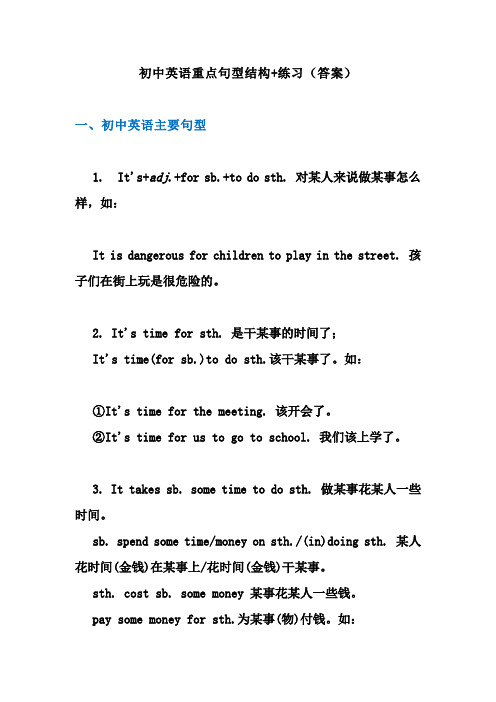
初中英语重点句型结构+练习(答案)一、初中英语主要句型1. It's+adj.+for sb.+to do sth. 对某人来说做某事怎么样,如:It is dangerous for children to play in the street. 孩子们在街上玩是很危险的。
2. It's time for sth. 是干某事的时间了;It's time(for sb.)to do sth.该干某事了。
如:①It's time for the meeting. 该开会了。
②It's time for us to go to school. 我们该上学了。
3. It takes sb. some time to do sth. 做某事花某人一些时间。
sb. spend some time/money on sth./(in)doing sth. 某人花时间(金钱)在某事上/花时间(金钱)干某事。
sth. cost sb. some money 某事花某人一些钱。
pay some money for sth.为某事(物)付钱。
如:① It took me two hours to write the letter. 写这封信花了我两小时的时间。
②He spends half an hour(in)reading English every morning.他每天早上花半小时读英语。
③ He spends one hour on the housework every day. 他每天花一小时做家务。
④ The bike cost me 500 yuan. 这辆自行车花了我500元。
⑤ I spent 500 yuan on the bike. 我买这辆自行车花了500元。
⑥ I paid 500 yuan for the bike. 我花了500元买这辆自行车。
初中英语重点句型100个

初中英语重点句型100个1、Welcome back to… eg. Welcome back to school/the factory. Welcome back home.2、It is much better than having class3、Some of the apples are hard to reach.4、Work must come first.5、The other students in the class keep their eyes closed例如:Don't keep your mother waiting Keep the students in/out.6、You had better stay at home.7、You'd better stay at hom, hadn't you? You'd better not stay at home.8、Walk(Go) along、down the road/street, and take the first turning on the left. =Turn left at the first turning9、We live in a place named Da Lian.10、I like to keep busy.11、Better late than never.12、There was a telephone call for you. Here is a letter for you.13、Thank a lot/very much/you for asking me to your party.14、Which is t he way to….?=How can I get to/reach/arrive in(at)/find….? Is there a …..near here?=Where is the…..?=Could you tell me the way to…..?15、It's too dangerous to cross the street. ( He is too young to go to school=He isn't old enough to go to school.=He is s o young that he can’t go to school.)16、the Read family= the Reads=Mr. and Mrs. Read17、the way you speak.18、He is on a visit to England.19、Come out for a walk in the park.20、I can wear it in my new hat.22、It was a pleasure ( for me).= With pleasure.21、The book cost me five yuan. I paid five yuan for the book.23、We won't go until we get it back again.(Wait until we come back)24、Chocolate is good for your heath25、Do you think it is good to do some housework?26、Either mum or I cook supper.27、Neither Dad nor my brother helps.28、Why don't men do a bit of housework?29、May I take your orders now?30、Could we have the bill?31、China is very famous for its food in the world. The poem was famous as Li Bai.32、Take the second turning on the left= Turn left at the second crossing.33、Either (Neither) of the answers is right.34、I like the film, and so dose he. (He likes the film. So he does.)35、We have to get up early in the morning =We have to be up early in the morning.36、How did he make the baby stop crying? (see ,watch, look at, notice,hear, listen to, feel ,make let ,have, help) eg. I saw her go into the house. Let me go. We noticed him come out . She was seen to go into the house.37、He told me not to bring you anything?38、finish+doing enjoy +doing be busy +doing practise +doing feel like+ doing… have fun doing sth. Can't help, be worth,He finished doing his homework. We are busy making some kites. We are going to have fun learning and speaking English this term.39、stop doing sth./stop to do sth. remember doing sth./remember to do sth. forget doing sth./forget to do sth. Eg. She stopped crying. She stopped to cry. I remember posting the letter.. I remember to post the letter. I forgot doing my homework. I forgot to do my homework.40、There are three girls walking in the park.41、We are going to have fun learning and speaking English this term.42、They have (get) some problems (difficulty) (in) doing sth.43、I don't know where he comes=I don't know. Where does he come?44、Do you know if/whether he got up early yesterday morning?= Do you know? Did he get up early yesterday morning?45、Why don't you wait for me here? = Why not wait for me here?46、He likes swimming in summer. He likes to swim.47、He found it very difficult to sleep./I think it very important to learn English well.( make,feel)48、I little (never,) dreamt of (about) seeing you here.49、I little (never) dreamt that I saw you here.50、I have been to the factory. He has gone to the factory.51、I have been in the factory for two years.52、It takes/took/will take sb. st. to do sth. eg. It took me an hour and a half to work out the difficult problem. It takes me one and a half hours to go to school on foot.53、I have two brothers. One is a worker.. The other is a doctor.54、There are lots of children playing in the park. Some are singing. Others are playing games.55、There are fifty students in our class. Thirty are girls. The others are boys.56、Let's make it 8:30/a little/a bit earlier57、He is as tall as I/me. He doesn't run as、so fast as I/me.58、He is interested in the film. The film is interesting.59、Not everyone likes sandwich.= Everyone doesn't like sandwich. Everyone likes sandwich. No one likes sandwich/None(None of them) like(s) sandwich.60、I don/t think he is right, is he? He doesn/t think you are right, does he? ( think, guess, except, suppose, imagine, believe.)61、There is little water in the bottle, is there/There is a little water in the bottle, isn't there? There are few books on the table, are there? There are a few books on the table, aren't there?62、Do you have one more to say? There are another three mooncakes left. Do you have one more to eat?63、The lights are still on. He must be at home, isn't he? He must have come here yesterday, didn't he?64、Do you mind my opening the door?65、Everybody is looking forward to May Day with great joy.66、He can't help crying.67、I am a student , aren't I?68、What's he?=What does he do?=What's his job?69、Jim is short for James70、Help yourselves to some grapes and watermelons.71、We often go on a picnic/our first field trip/a long journey to the west of China. 72、I often see some students at school talking to each other in English.(see, find, watch, hear)73、Sometimes we find them driving the tractors on the farm.74、I think every minute counts.75、He was unhappy, wasn't he?76、He used to get up early, didn't/usedn't he? He didn't use to get up early. Did he use to get up early? = Used he to get up early? He is used to getting up early, isn't he? He isn't used to getting up early.77、He eats too much food so he grows fatter and fatter. The book is much too expensive78、Give me a book=Give a book to me. Show him a spade= Show a spade to him. (tell, hand, bring, return, send ,leave, offer pass, cause)80、He who does not work neither shall he eat.81、I'll have、get my hair cut.82、Will you please say it again more slowly?83、The wall needs/wants painting. The wall wants to be painted.84、What can I do for you?= Can/May I help you?85、Hurry up, and you'll get there in time.= If you hurry up, you'll get there in time. 86、Hurry up, or you'll be late for school. = If you don't hurry up, you'll be late for school.87、Neither answer you have given is right88、Lin Tao didn't know anything about it, neither/nor did Tom.89、I didn't know anything about it. Tom didn't know anything about it, either.90、He has come here, and so have I. I have also come here. I have come here, too 91、He goes there, and so do I. I also go there. I go there ,too.92、He is a student, and so am I. I am also a student. I am a student ,too.93、In Britain, sales of cigarettes have been reduced by 30% in the last ten years. During the past two years, I have learned 2000 English words94、The number of the students has reached 1700.95、A number of the students have come here already.96、It's a mistake for you to go there at night.97、It's very kind of you to help me.98、The number of the students has reached 1700.99、A number of the students have come here already.100、It's a mistake for you to go there at night.101、It's very kind of you to help me.102、What's wrong with you?=What's the matter with you?=What's your trouble? 103、He comes from Hennan.=He is from Hennan.104、What's the time?=What time is it (by your watch)?105、Whose shirt is it?=Whose is this shirt?106、What's in a name?108、I can't help laughing at the news. I can’t help to carry that heavy box for you. 109、I regretted saying so much words at the meeting. I regretted to tell you about it. 110、I tried making the kite yesterday. I tried to work out the maths problem yesterday.111、You must keep your son from going there. You can't keep your mother waiting there so long. 112、She preferred singing to dancing. She preferred him to go home. She preferred to stay at school rather than go home. She preferred to go shopping after school.113、I spent two days in doing my homework. I spent five yuan on that book.。
初中英语重点句型归纳与解析
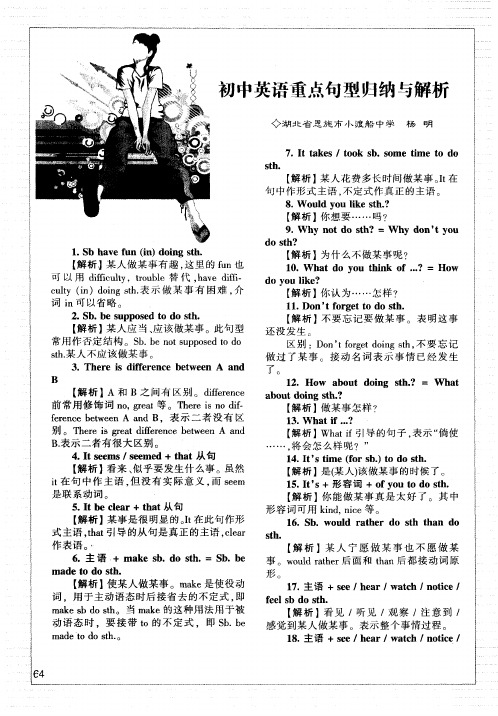
【 析】 ( 解 是 某人) 做某事 的时候 了 。 该
1 . t s+ 形 容 词 +o o o d t . 5 I’ fy u t o sh
【 析 】你 能做 某 事 真是 太好 了。其 中 解
形容 词 可用 kn , ie 。 id nc 等
B
区别 : o ’ fre d igs , D n tog t o t 不要 忘 记 n h 做 过 了某 事 。接 动 名 词 表示 事 情 已经发 生
了。
1 2. Ho w a ou do ng t ? = Ⅵ a b t i sh. t a ou i t ? b tdo ng s h.
【 析 】A和 B之 间 有 区别 。dfrne 解 ieec f 前常 用修 饰词 n , ra 等 。T eei n i o get h r odf s -
frn eb te nA a dB.表 示 二者 没 有 区 ee c e e n w 别 。T eei get iee c e e nA a d h r s ra df rn eb t e n f w B表示 二者有很 大 区别 。 . 4 I e / eme .t ems se d+t a 从 句 s ht
【 解析 】 某事 怎样? 做
1 .W ha f…? 3 ti
【 解析 】 a i 引导 的句子 , Wh tf 表示 “ 倘使
… …
将会 怎 么样 呢 ?” l . tst 4 I’ i me( rs .t osh f b1 od . o t
。
【 解析 】 看来 、 乎要发 生什 么事 。虽然 似 i在句 中作 主语 , 没有 实 际 意义 , se t 但 而 em 是联 系动词 。
中考英语重点句型(基础、对话和写作)

初中英语重要句型总结其中含有基本句型、对话句型以及写作句型:1:There+be +主语+地点状语/时间状语There's a boat in the river.河里有条船。
There are seven days in a week.一周有七天。
2:What's wrong with+sb./sth.?What's wrong with you?你怎么啦?What's wrong with your watch?你的手表有什么毛病?3:How do you like...?How do you like China?你觉得中国怎么样?4:What do you like about...?What do you like about China?你喜欢中国的什么?5:had better(not)+动词原形You'd better ask that policeman over there.你最好去问问那边的那个警察。
6:How+adj./adv.+主语+谓语!What a/an+adj.+n.+主语+谓语!How cold it is today !今天多冷啊!What a fine picture it is!多美的一幅图画呀!7:Thank+sb.+for(doing)sth.Thank you for coming to see me.感谢你来看我。
8:So+be/情态动词/助动词+主语He is a student.So am I.他是一个学生,我也是。
9:...not...until...He didn't have supper until his parents came back.直到他的父母回来他才吃饭。
10:比较级+and+比较级The baby cried harder and harder.那孩子哭得越来越厉害。
11:the +比较级,the +比较级The more one has,the more one wants.越有越贪。
初中英语重点句型汉译英(必考一)
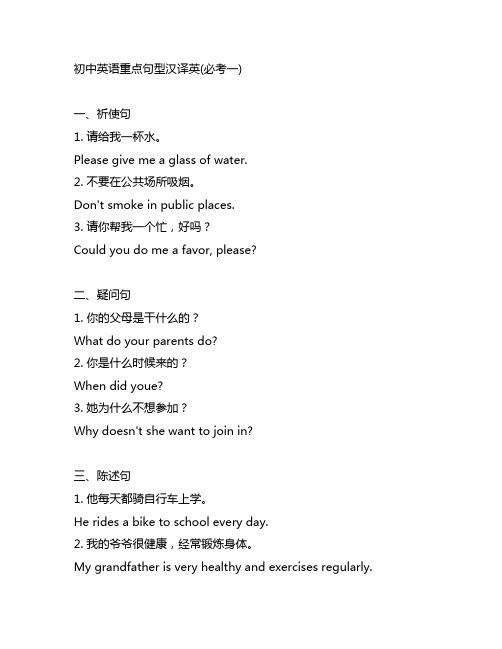
初中英语重点句型汉译英(必考一)一、祈使句1. 请给我一杯水。
Please give me a glass of water.2. 不要在公共场所吸烟。
Don't smoke in public places.3. 请你帮我一个忙,好吗?Could you do me a favor, please?二、疑问句1. 你的父母是干什么的?What do your parents do?2. 你是什么时候来的?When did youe?3. 她为什么不想参加?Why doesn't she want to join in?三、陈述句1. 他每天都骑自行车上学。
He rides a bike to school every day.2. 我的爷爷很健康,经常锻炼身体。
My grandfather is very healthy and exercises regularly.3. 我国是一个历史悠久的文明古国。
China is an ancient civilization with a long history.四、感叹句1. 多么美好的一天啊!What a beautiful day!2. 真是个好消息!What a good news!3. 天气怎么这么糟糕!What terrible weather!五、并列句1. 我喜欢唱歌,也喜欢跳舞。
I like singing and dancing.2. 他昨天买了一本书,又去看了一部电影。
He bought a book yesterday and went to see a movie.3. 你可以选择去滑雪或者去爬山。
You can choose to go skiing or climbing.六、复合句1. 我喜欢在室外运动,因为新鲜空气对健康有益。
I like doing outdoor exercises, for fresh 本人r is good for health.2. 她想报名参加马拉松比赛,但是她的腿受伤了。
初中英语110个重要短语和句型汇总

初中英语110个重要短语与句型汇总1.put down 放下 shut down 把…关上cut down砍掉come down下来、落下slow down 减缓、放慢sit down坐下write down写下get down下来,降落2.after all毕竟。
终究after that于是。
然后day after day日复一日地one after another相继。
挨次soon after不久以后the day after tomorrow后天3。
come up with找到、提出catch up with赶上wake up弄醒、醒来send up发射open up开设、开办grow up长大pick up拾起、捡起hands up举手eat up吃光clean up 打扫干净give up doing sth。
=stop doing sth。
放弃做某事4.arrive at/in + n。
到达get to +n。
到达reach + n。
到达arrive / get +adv。
到达5.get…back退还,送回去。
取回give back归还come back回来at the back of在…的后面on the way (back)home在回家路上6。
at least至少at breakfast早餐时at desk在桌前at once立刻,马上at school 在上学at the same time同时at work在工作be good at=do well in 善长laugh at嘲笑not…at all一点也不at first起初at night在晚上at noon中午。
at the age of // when sb。
was…years old 在…岁时at last / in the end / finally 最后、终于。
at the beginning of the twenty-first century在21世纪初,at the end of 在…终点、结尾at the moment // now现在at the foot of在…脚下at Christmas在圣诞节at any moment 任何时候at times(sometimes)有时,偶尔at the doctor’s在医务室be bad at不善长7.for example例如for ever永远be good for对…有益be bad for对…有害for long=for a long time长期for short 简称be short for是…的简称TV is short for “television”8。
中考英语100句重点句型
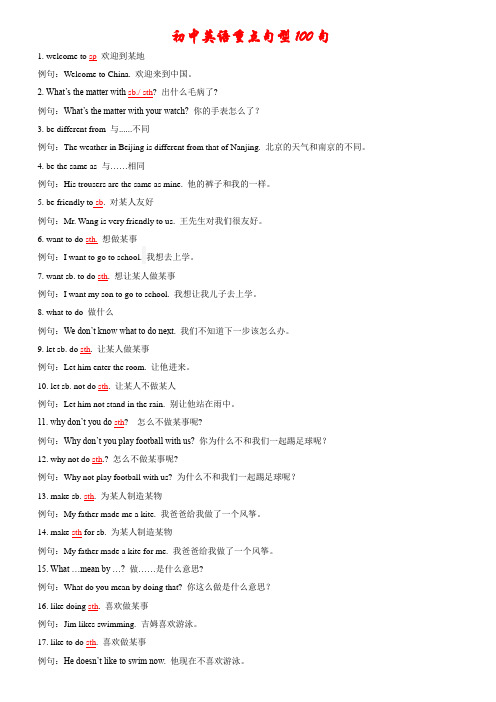
初中英语重点句型100句1. welcome to sp欢迎到某地例句:Welcome to China. 欢迎来到中国。
2. What’s the matter with sb./ sth? 出什么毛病了?例句:What’s the matter with your watch?你的手表怎么了?3. be different from 与......不同例句:The weather in Beijing is different from that of Nanjing. 北京的天气和南京的不同。
4. be the same as 与……相同例句:His trousers are the same as mine. 他的裤子和我的一样。
5. be friendly to sb. 对某人友好例句:Mr. Wang is very friendly to us. 王先生对我们很友好。
6. want to do sth.想做某事例句:I want to go to school.我想去上学。
7. want sb. to do sth. 想让某人做某事例句:I want my son to go to school. 我想让我儿子去上学。
8. what to do 做什么例句:We don’t know what to do next.我们不知道下一步该怎么办。
9. let sb. do sth. 让某人做某事例句:Let him enter the room. 让他进来。
10. let sb. not do sth. 让某人不做某人例句:Let him not stand in the rain. 别让他站在雨中。
11. why don’t you do sth?怎么不做某事呢?例句:Why don’t you play football with us?你为什么不和我们一起踢足球呢?12. why not do sth.? 怎么不做某事呢?例句:Why not play football with us? 为什么不和我们一起踢足球呢?13. make sb. sth. 为某人制造某物例句:My father made me a kite. 我爸爸给我做了一个风筝。
初中英语重点句型归纳

初中英语重点句型归纳一、陈述句型1. 主语 + be动词 + 表语例句:I am a student.2. 主语 + 动词 + 宾语例句:Tom likes playing basketball.3. 主语 + 动词 + 间接宾语 + 直接宾语例句:My mother bought me a new book.4. 主语 + 动词 + 宾语 + 宾语补足语例句:We elected him monitor.5. 主语 + 动词 + 宾语 + 宾语补足语 + 宾语补足语例句:They made him chairman.6. 主语 + do/does + not + 动词原形例句:She does not like swimming.7. Do/Does + 主语 + 动词原形例句:Do you like English?8. 主语 + have/has + 过去分词例句:He has finished his homework.9. 主语 + have/has + not + 过去分词例句:They haven't seen the film yet.10. Have/Has + 主语 + 过去分词例句:Have you ever visited Beijing?11. There be句型例句:There is a book on the desk.12. It be + adj. + 不定式例句:It is important to learn English well.13. It is + adj. + for + 人 + to + 不定式例句:It is difficult for me to solve the math problem.二、疑问句型1. Yes/No问句:句型为:Do/Does + 主语 + 动词原形?例句:Do you like English?2. 特殊疑问句:以特殊疑问词(what, where, when, why, who, how等)开头。
初中英语重点短语句型大全
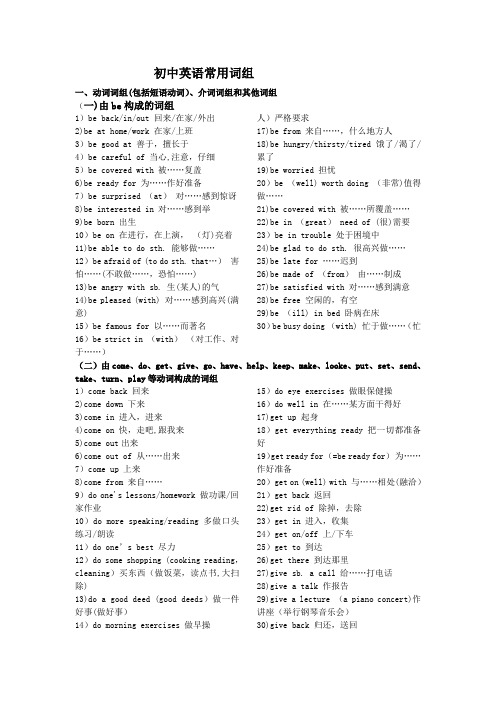
初中英语常用词组一、动词词组(包括短语动词)、介词词组和其他词组(一)由be构成的词组1)be back/in/out 回来/在家/外出2)be at home/work 在家/上班3)be good at 善于,擅长于4)be careful of 当心,注意,仔细5)be covered with 被……复盖6)be ready for 为……作好准备7)be surprised (at)对……感到惊讶8)be interested in 对……感到举9)be born 出生10)be on 在进行,在上演,(灯)亮着11)be able to do sth. 能够做……12)be afraid of (to do sth. that…)害怕……(不敢做……,恐怕……)13)be angry with sb. 生(某人)的气14)be pleased (with) 对……感到高兴(满意)15)be famous for 以……而著名16)be strict in (with)(对工作、对人)严格要求17)be from 来自……,什么地方人18)be hungry/thirsty/tired 饿了/渴了/累了19)be worried 担忧20)be (well) worth doing (非常)值得做……21)be covered with 被……所覆盖……22)be in (great) need of (很)需要23)be in trouble 处于困境中24)be glad to do sth. 很高兴做……25)be late for ……迟到26)be made of (from)由……制成27)be satisfied with 对……感到满意28)be free 空闲的,有空29)be (ill) in bed 卧病在床30)be busy doing (with) 忙于做……(忙于……)(二)由come、do、get、give、go、have、help、keep、make、looke、put、set、send、take、turn、play等动词构成的词组1)come back 回来2)come down 下来3)come in 进入,进来4)come on 快,走吧,跟我来5)come out出来6)come out of 从……出来7)come up 上来8)come from 来自……9)do one's lessons/homework 做功课/回家作业10)do more speaking/reading 多做口头练习/朗读11)do one’s best 尽力12)do some shopping (cooking reading,cleaning)买东西(做饭菜,读点书,大扫除)13)do a good deed (good deeds)做一件好事(做好事)14)do morning exercises 做早操15)do eye exercises 做眼保健操16)do well in 在……某方面干得好17)get up 起身18)get everything ready 把一切都准备好19)get ready for (=be ready for)为……作好准备20)get on (well) with 与……相处(融洽)21)get back 返回22)get rid of 除掉,去除23)get in 进入,收集24)get on/off 上/下车25)get to 到达26)get there 到达那里27)give sb. a call 给……打电话28)give a talk 作报告29)give a lecture (a piano concert)作讲座(举行钢琴音乐会)30)give back 归还,送回31)give……some advice on 给…一些忠告32)give lessons to 给……上课33)give in 屈服34)give up 放弃35)give sb。
初中英语重点句型归纳
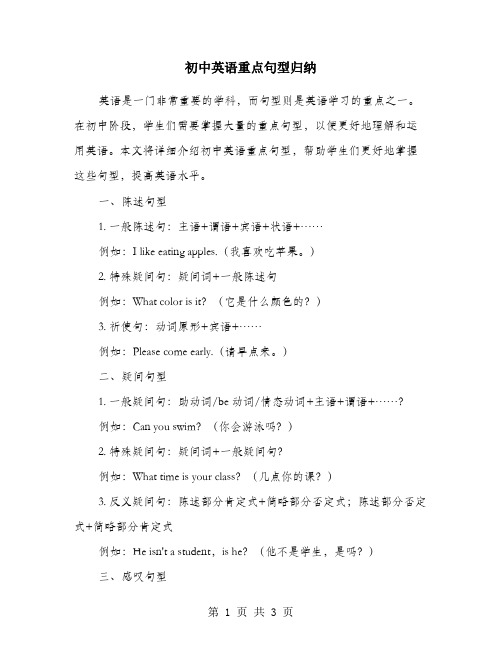
初中英语重点句型归纳英语是一门非常重要的学科,而句型则是英语学习的重点之一。
在初中阶段,学生们需要掌握大量的重点句型,以便更好地理解和运用英语。
本文将详细介绍初中英语重点句型,帮助学生们更好地掌握这些句型,提高英语水平。
一、陈述句型1. 一般陈述句:主语+谓语+宾语+状语+……例如:I like eating apples.(我喜欢吃苹果。
)2. 特殊疑问句:疑问词+一般陈述句例如:What color is it?(它是什么颜色的?)3. 祈使句:动词原形+宾语+……例如:Please come early.(请早点来。
)二、疑问句型1. 一般疑问句:助动词/be动词/情态动词+主语+谓语+……?例如:Can you swim?(你会游泳吗?)2. 特殊疑问句:疑问词+一般疑问句?例如:What time is your class?(几点你的课?)3. 反义疑问句:陈述部分肯定式+简略部分否定式;陈述部分否定式+简略部分肯定式例如:He isn't a student,is he?(他不是学生,是吗?)三、感叹句型1. What+a/an+形容词+可数名词单数+主语+谓语!例如:What a beautiful flower it is!(多么美丽的花啊!)2. How+形容词/副词+主语+谓语!例如:How fast he runs!(他跑得多快啊!)四、强调句型It is/was+被强调部分(主语/宾语/状语)+that/who+其他部分。
这个句型用于强调句中,强调某个成分时,一定要注意语序和时态。
被强调部分可以是主语、宾语或状语等。
强调主语时,可以用“Itis/was the +名词词组”来表达;强调宾语时,可以用“It was/is the (an) +形容词+名词词组+that”来表达;强调状语时,则要注意改变句子结构和时态。
这个句型在使用时需要注意一些固定用法和特殊用法。
初中英语重点句型总结(双语)

初中英语重点句型总结(双语)1assoonas我一到那就给你打电话。
I’llcallyouassoonasIarrive/getto/reachthere.我刚旅行回来就见到了爷爷。
IsawgrandpaassoonasIcamebackfromthetrip.他一到家就开始下雨了。
Assoonashegothome,itbegantorain.2as…as李平做作业不如Lucy细心,所以她老犯同样的错误。
LiPingdoesn’tdohomewo rkascarefullyasLucy,soshealwaysmakes/keepsmakingthesamemistake.我和他一样高。
Iiamastallashim.他跑得不如你快。
Hedoesn’trunasquicklyasyou.3as…aspossible我会尽快给你打电话。
Iwillcallyouassoonaspossible.请尽早起床。
Pleasegetupasearlyaspossible.学英语的最好方法是尽可能多听,多说。
ThebestwaytolearnEnglishwellistolistenandspeakasmuchaspossible.4asksb.forsth.你可以向那边的警察求助。
Youcanaskthepolicemanforhelp.无论她要什么,父母都会为她找到。
Nomatterwhatsheasksfor,herparentswilltrytogetit.他从不向父母要零花钱,是吗?Heneveraskspocketmoneyfromhisparents,doeshe?5.6.ask/tellsb.(not)/(how)todosth.我父亲经常问我如何使用电脑。
Myfatheroftenasksmehowtousethecomputer.我妈妈让我不要太早去学校。
Mymotheraskedmenottogotoschoolearly.我们可以向物理老师问如何做这个实验。
初中英语110个重要短语与句型汇总
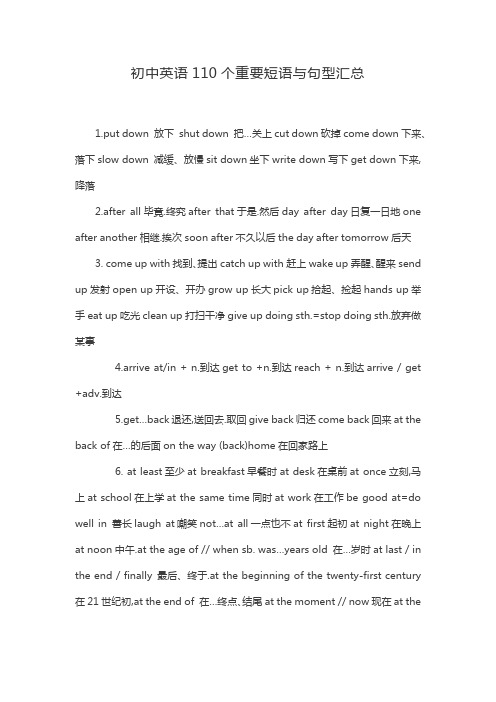
初中英语110个重要短语与句型汇总1.put down 放下shut down 把…关上cut down砍掉come down下来、落下slow down 减缓、放慢sit down坐下write down写下get down下来,降落2.after all毕竟.终究after that于是.然后day after day日复一日地one after another相继.挨次soon after不久以后the day after tomorrow后天3. come up with找到、提出catch up with赶上wake up弄醒、醒来send up 发射open up开设、开办grow up长大pick up拾起、捡起hands up举手eat up 吃光clean up打扫干净give up doing sth.=stop doing sth.放弃做某事4.arrive at/in + n.到达get to +n.到达reach + n.到达arrive / get +adv.到达5.get…back退还,送回去.取回give back归还come back回来at the back of在…的后面on the way (back)home在回家路上6. at least至少at breakfast早餐时at desk在桌前at once立刻,马上at school在上学at the same time同时at work在工作be good at=do well in 善长laugh at嘲笑not…at all一点也不at first起初at night在晚上at noon中午.at the age of // when sb. was…years old 在…岁时at last / in the end / finally 最后、终于.at the beginning of the twenty-first century在21世纪初,at the end of 在…终点、结尾at the moment // now现在at the foot of在…脚下at Christmas 在圣诞节at any moment任何时候at times(sometimes)有时,偶尔at the doctor's在医务室be bad at不善长7.for example例如for ever永远be good for对…有益be bad for对…有害for long=for a long time长期for short 简称be short for是…的简称TV is short for “television”8. come true实现come down下来come from=be from来自,出生于come in/into进入,进来come on赶快come over过来come along走吧,过来,快点,come and go来来去去come up上来come out出来,(花)开,(照片)冲洗出来9.even though=even if即使、虽然、尽管10. be pleased with对…感到满意be covered with被…覆盖be expected to do sth.被期望做某事be proud of 以…自豪speak highly of 称赞be afraid of害怕hear of听说(hear from sb.收到某人的来信)of cause=certainly当然可以plenty of= a lot of许多11.by the way顺便说by oneself单独,独自by the end of到…为至by the time(引起时间状语从句)到…的时候one by one依次by air / plane乘飞机by bus / train / car乘公共汽车/火车/轿车(catch a bus赶公交车get on / off the bus上/下车take a bus to…=go to …by bus乘车去)12.do / try one’s best尽力do one’s homework做家庭作业do (the/some) shopping购物do the cooking烹饪do some cleaning打扫do the / some washing洗衣服do sport做运动do with sb. / sth.处理well done干得好13.early in the morning一大早in the early spring初春in my early days 我幼年时期early bus早班车14.make a contribution to贡献给、捐献make a telephone call to sb. // ring sb. up // give sb. a call // phone sb.给某人打电话connect…to…把…与…连接起来be close to靠近(某地) give birth to生(孩子) lose to sb.输给sb.15.either…or…或者…或者..on either side of the street街道任何一边(on each side of the street街道每一边on both sides of the street街道两边)16.keep doing sth.不停地做某事(表示状态继续)keep on doing sth. 坚持做某事(表示动作反复进行)practice doing sth.练习做某事enjoy doing sth.喜欢做某事finish doing sth.做完某事go on doing sth.继续做某事(同一件事)17.go on to do sth.接着做某事(另一事) go straight along 沿着…一直往前走, go down下降, go for a walk散步, go over复习, go shopping买东西, go to the cinema去看电影, go well进展顺利, go off to动身前往, go out外出, go to work去上班, go up上升, want a go 想试一试18. think about考虑(think of 认为、想起、考虑、想到think over仔细考虑think out想出)talk about谈论, worry about担心, How / What about…?…怎么样?19.borrow…from …从…借….(lend…to…把…借给…)from door to door挨家挨户, from time to time时时, from now on 从今以后, from then on 从那以后, be different from与…不同, learn…from…向…学习20.get dressed穿衣, get into进入, get / be lost丢失, get off / on下/上车, get on well with sb.与某人相处得好, get out of从…出来, get ready for +n.为…做准备, get ready to do sth.准备做某事, get / go to sleep (fall asleep)入睡, (be asleep睡着) get warm 变暧, get well康复, get a chance 有机会、得到机会21. look for 寻找, wait for等候, look after=take care of照看, look like看起来像, look over检查,复习, look out小心,从里向外看, look the same 看起来一样, look up向上看,查单词, look around环视look forward to期望, look through温习,检查22. set off 出发、动身, put off 推迟, keep off 避开、不靠近…drop off 放下(某物),turn off关, jump off跳离, take off脱(衣),(飞机)起飞23. half a kilo半千克, half an hour半小时, in half分成两半, half of the day半天24. do eye exercises做眼保健操, do morning exercises做早操take (more) exercise (多)参加体育锻炼, an exercise book练习本25. take part in参加, hand in上交, in hospital住院, in surprise吃惊地, in the sun在阳光下, in trouble处于困境, in a minute / moment马上26. leave for…动身去某地27 feed on 以…为主食, live on继续活着, base on以…为根据, carry on坚持、继续下去, and so on 等等, on the other hand另一方面, on foot步行28.be famous for以..著名, be excited about +n./V-ing对…感到兴奋, be interested in 对…感兴趣, be born出生, be busy with sth.—be busy doing sth.忙于…be amazed at 对..感到惊讶29.move away移开, move to(搬)移到30.search the Internet上网31.make sure 确信, make a dialogue编对话, make a mistake犯错误(by mistake由于疏忽) make a noise吵闹, make faces做鬼脸, make friends (with)和..交朋友, make room for给..让地方, make tea沏茶, make money赚钱, make a decision作出决定ed to do sth过去常常做某事, be used to doing sth.习惯于做某事33. leave sth+介词短语“把……忘记在某处”34.forget to do sth.忘记做某事, encourage sb. to do sth.鼓励某人做某事, decide to do sth.决定做某事, allow sb. to do sth.允许某人做某事35.hear sb. to do (doing)sth.听见某人做某事36.help sb. (to) do sth .//help sb. with sth. 帮助某人做某事, with one’s help在某人的帮助下, with pleasure乐意37.the summer holiday(s)暑假the winter holiday(s)寒假38.step into走进, pour into倒入…39.in the first第一, for the first time第一次, at first起初, a firs t language母语, first of all首先40.leave a message for sb.给某人留条, give / take sb. a message给某人捎口信想学习更多英语知识,请关注口袋英语aikoudaiyy41. take photos / pictures 照像, take away拿走, take out取出(work out算出) take care当心, take medicine 服药take one's temperature 量体温, take one's time别着急, take a walk散步, take place发生42. learn by oneself / teach oneself自学, learn by heart背熟43. a year and a half (one and a half years ) 一年半44.have a try尝试,努力, try out尝试、试验, find out / about找出,查明, have a good / wonderful / great / time玩得开心, have a (bad) cold(重)感冒, have a meeting / walk / watch开会/散步/比赛, have sports进行体育活动, have nothing / sth. to do with与..无(有)关, have no idea不知道, have (one's) medicine服药45. offer sb. sth.给某人提供某物46.win first prize获一等奖47.all over the world= around the world =throughout the world全世界48. all kinds of 各种各样的49. neither…nor 既不…也不….50. not only …but also …不但…而且, both…and ……和…都51. the more , the better 越多越好52. all one’s life 一生53. as soon as 一…就…as soon as possible尽可能早地、尽快as well = too也, as much as至多, as little as至少, regard …as 把…当作…, as if 好像54. no matter 无论…55 ever since 从那以后,此后一直56.so far 到目前为止, or so大约57. another two hours (=two more hours )又(再) 2个小时58. three times a week一周三次59. the number of…的数量a (large / good) number of / large numbers of / many许多60.less than少于, less and less 越来越少61.…is another way of saying…什么是..的另一说法Quick is another way of saying fast. Bike is short for bicycle.62. not…until…直到…才…63.be like像, feel like +n./V-ing想要, like best最喜欢, would like to 想要64.the 24 hour clock 24小时制65.wash away冲走,run away逃跑, take away带走66.before long不久, long before / ago很久以前, for long =for a long time长期, no longer = not. .any longer不再67.more or less = about或多或少,大约more than = over多于,超过68.every year每年, every four years每隔四年, every other day每隔一天, everyday English / life日常英语/生活69. next to紧挨着, next door隔壁,邻居, next year明年, next time下次70.receive / get / have a letter from sb. = hear from sb 收到某人的来信71.on show = on display展览72.be filled with / be full of充满…73. thank to =because of由于74.some day =one day(将来)某一天, all day终日, day and night 日日夜夜, ina day or two一两天内in the old days从前,旧社会, from day to day (day after day)日复一日, the day before yesterday前天, the day after tomorrow后天, Tree Planting Day植树节, Women’s Day 妇女节75. keep / stop / prevent…(from) doing sth.防止(阻止)…做某事, stop to do sth.停下来去做某事, stop doing sth.停止做某事76.nice and +adj. = very +adj.很,非常77. a place (places) of interest 名胜78.three quarters of the information on the Internet因特网上四分之三的信息, two thirds of the books三分之二的书79. credit card信用卡80. the increasing population增长着的人口81 a path of travel旅行路线82 . point at / to指向83. by sea = by ship乘船, by the sea = on the sea 在海边, at sea在海上84. set one’s mind to do sth.一心想做某事85 .multiply…by…乘以…86. See you!再见You see.你知道,你明白,你瞧, Let me see.让我想想, see sb. off给某人送行, see a / the doctor看病, see sb. do / doing sth.看见某人做某事87 some…others一些(人,物)…其他(人,物) one…another一个..另一个(三者或以上) one…the other一个…另一个(总数二个)88. be worn out穿旧,磨坏, check out核实,检查, write out写出, take sth. out of从…拿出/取出某物89. in this way用这种方法, in a few year's time几年以后, in space 在太空, in and out of class在课内课外, in the last fifteen minutes在最后十五分钟里, in the second half 在下半场, later in one's life在某人后半身, in the air在空中, in the open air在户外90.give sb. an injection给某人打针, get an injection打针91.have been to去过某地, have gone to到某地去了92.here + be+ 名词+ for+某人( Here is a letter for you.这儿有你的一封信.)93.be far behind +某人(He is far behind others. 他落后于别人)94. one of + adj.最高级+复数名词95. take +某物+with +某人(You' d better take an umbrella with you.你最好带上雨伞)96. prefer to= like…better than宁愿,更喜欢prefer + V-ing (to do sth.) ( I prefer doing (to do) it myself .我喜欢自己做那件事). Would / should等情态动词+ prefer +不定式. (I would prefer to do it myself.我宁愿自己做那件事) , prefer +名词(v-ing) + to+名词(v-ing) (I prefer learning English to playing football.我愿意学英语而不愿踢足球) ; prefer +不定式(名词)+ rather than + 不带to的不定式, (Iprefer to walk there rather than go by bus.我喜欢走着去那里,而不愿乘车) , prefer + 名词(代词) to do sth. (We prefer her not to come.我们宁愿她不来)97. 人+ spend +time (money) +(in) doing sth. (I spent over two hours (in) finishing my homework.我花了两个多小时完成家庭作业.) , 人+ spend + time (money) + on +名词, (He spent 1,000 on the TV set .他花了一千元买电视机). 人+ pay + money +for +sth. ( He paid ten Yuan for the book .他花了10元钱买那本书.) It + takes (will take, / took…) + sb. + time (money) + to do sth. (It'll take you only ten minutes to get there by bus.乘车去那里只花你10分钟). 物+ cost + (sb.) + money, (The dictionary cost me 20 Yuan .我花20元钱买了那本词典)98. do with + sb. / sth. (What have you done with the pork ? 那些肉你怎么处理了?)99. mind + if 从句, (Do you mind if I open the window?我开窗你不反对吧?) mind + V-ing, (Would you mind turning on the TV?打开电视你不反对吧?)100. what…for? / why…? (What do you learn English for? = Why do you learn English?)101. need + 名词(v-ing), (The students need some help.学生们需要帮助.This pair of shoes needs mending.这双鞋需要修理)102. “be used for+ 名词(v-ing),”被用来做.. (A writing brush is used for writing.) “be used as+名词”, 被作为…使用(English is used as the first language in none of these countries. ) “be used by+动作执行者”, 被…使用,103.be made of 由…制造(This table is made of wood .这张课桌是木制的) be made from由…制成(This kind of paper is made from wood . 这种纸是用木材制成的) be made in+地点, “某地制造”(These cars are made in Germany) be made by+人, “由谁制造的”(This kite is made by Kate . ) 104. more developed countries发达国家, less developed countries不发达国家, developing countries发展中国家105.be worth + money (V-ing),值…钱.值得做…This car is worth more than two million Yuan in China. This book is well worth reading.这本书很值得一读.106. the Summer Palace颐和园, Tian'anmen Square 天安门广场, the Palace Museum故宫, the Great Hall of the People人民大会堂, the Temple of Heaven天坛, the Great Green Wall绿色长城, PLA中国人民解放军, PRC中华人民共和国, the Party中国共产党, the League共青团, Peking Opera京剧107 a digital camera数字照相机, a doctor for animals = an animal doctor动物医生108. so + 形/副+that 从句, (The place is so cold that nothing can grow in winter .这地方太冷,冬天什么都不长) so + many / few+ 复数名词+that 从句(He has so many books that I don’t know which one to borrow. 他有那么多书,我不知道借哪一本) so + much / little+ 不可数名词+that从句(She has so little money that she can’t buy anything .她钱太少,什么也买不到.) so+ 形容词+a / an +单数名词+that从句(This is so good a book that all of us like readingit ) , such +a / an+ 形容词+单数名词+ that从句(This is such an interesting story that all of us like it) , such +形容词+复数名词+that从句. such +形容词+不可数名词+that从句(It is such fine weather today that many children are playing outside)109 .tell sb. about sth.告诉某人关于某事, tell sb. +从句, tell sb. to do sth.让某人做某事, tell a lie说谎, tell a story讲故事, thank you for +n ./V-ing 谢谢你…too + adj. / adv. + to + v.太…而不能, too much(修饰名词)太多,过分, much too(修饰adj./adv.)太110. hope / wish+不定式(或从句), wish sb. to do sth. What do you mean by…?= What does…mean?…是什么意思?。
求初中英语基本句型,基本结构
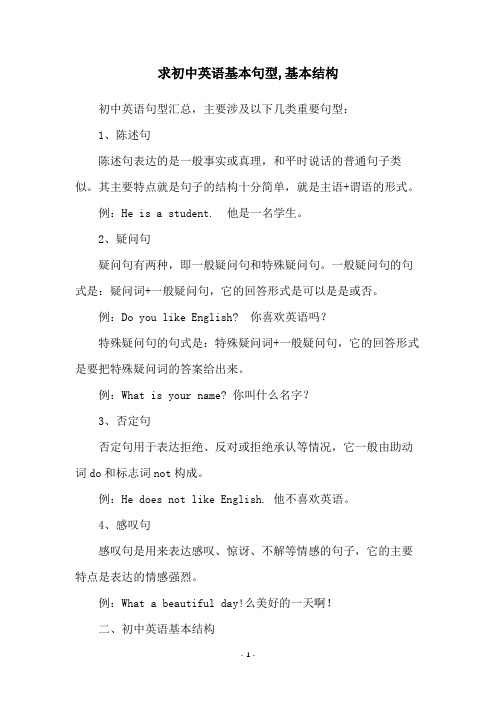
求初中英语基本句型,基本结构初中英语句型汇总,主要涉及以下几类重要句型:1、陈述句陈述句表达的是一般事实或真理,和平时说话的普通句子类似。
其主要特点就是句子的结构十分简单,就是主语+谓语的形式。
例:He is a student. 他是一名学生。
2、疑问句疑问句有两种,即一般疑问句和特殊疑问句。
一般疑问句的句式是:疑问词+一般疑问句,它的回答形式是可以是是或否。
例:Do you like English? 你喜欢英语吗?特殊疑问句的句式是:特殊疑问词+一般疑问句,它的回答形式是要把特殊疑问词的答案给出来。
例:What is your name? 你叫什么名字?3、否定句否定句用于表达拒绝、反对或拒绝承认等情况,它一般由助动词do和标志词not构成。
例:He does not like English. 他不喜欢英语。
4、感叹句感叹句是用来表达感叹、惊讶、不解等情感的句子,它的主要特点是表达的情感强烈。
例:What a beautiful day!么美好的一天啊!二、初中英语基本结构1、主谓宾结构主谓宾结构是简单句最基本的结构,也是一般句子中最常用的结构。
它的结构形式为:主语+谓语+宾语,即句子的主干部分,句子的主要意思在这部分表达出来。
例:She likes English.喜欢英语。
2、主系表结构主系表结构是将主语和系动词连在一起,以表示主语的状态或情况。
它的结构形式为:主语+系动词+表语,即以系动词作连接,表语用以表达主语的属性或情况。
例:She is a student.是一名学生。
3、主谓宾宾补结构主谓宾宾补结构又称为三宾结构,有时也可以称为四宾结构。
它的结构形式为:主语+谓语+宾语+宾补,即句子的主干内容有三部分,用以表达主语的动作的客观结果。
例:He made me a cup of tea. 他给我做了一杯茶。
4、主谓表结构主谓表结构是一种特殊的结构形式,它主要是用来表示一种状态,而不是表示动作。
- 1、下载文档前请自行甄别文档内容的完整性,平台不提供额外的编辑、内容补充、找答案等附加服务。
- 2、"仅部分预览"的文档,不可在线预览部分如存在完整性等问题,可反馈申请退款(可完整预览的文档不适用该条件!)。
- 3、如文档侵犯您的权益,请联系客服反馈,我们会尽快为您处理(人工客服工作时间:9:00-18:30)。
1) leave的用法1.“leave+地点”表示“离开某地”。
例如:When did you leave Shanghai?你什么时候离开上海的?2.“leave for+地点”表示“动身去某地”。
例如:Next Friday, Alice is leaving for London.下周五,爱丽斯要去伦敦了。
3.“leave+地点+for+地点”表示“离开某地去某地”。
例如:Why are you leaving Shanghai for Beijing?你为什么要离开上海去北京?2) 情态动词should“应该”学会使用should作为情态动词用,常常表示意外、惊奇、不能理解等,有“竟会”的意思,例如:How should I know? 我怎么知道?Why should you be so late today? 你今天为什么来得这么晚?should有时表示应当做或发生的事,例如:We should help each other.我们应当互相帮助。
我们在使用时要注意以下几点:1. 用于表示“应该”或“不应该”的概念。
此时常指长辈教导或责备晚辈。
例如:You should be here with clean hands. 你应该把手洗干净了再来。
2. 用于提出意见劝导别人。
例如:You should go to the doctor if you feel ill. 如果你感觉不舒服,你最好去看医生。
3. 用于表示可能性。
should的这一用法是考试中常常出现的考点之一。
例如:We should arrive by supper time. 我们在晚饭前就能到了。
She should be here any moment. 她随时都可能来。
3) What...? 与Which...?1. what 与which 都是疑问代词,都可以指人或事物,但是what仅用来询问职业。
如:What is your father? 你父亲是干什么的?该句相当于:What does your father do?What is your father's job?Which 指代的是特定范围内的某一个人。
如:---Which is Peter? 哪个是皮特?---The boy behind Mary. 玛丽背后的那个男孩。
2. What...?是泛指,所指的事物没有范围的限制;而Which...?是特指,所指的事物有范围的限制。
如:What color do you like best? (所有颜色)你最喜爱什么颜色?Which color do you like best, blue, green or yellow? (有特定的范围)你最喜爱哪一种颜色?3. what 与which 后都可以接单、复数名词和不可数名词。
如:Which pictures are from China?哪些图片来自中国?4) 频度副词的位置1.常见的频度副词有以下这些:always(总是,一直)usually(通常)often(常常,经常)sometimes(有时候)never(从不)2.频度副词的位置:a.放在连系动词、助动词或情态动词后面。
如:David is often arrives late for school.大卫上学经常迟到。
b.放在行为动词前。
如:We usually go to school at 7:10 every day.我们每天经常在7:10去上学。
c.有些频度副词可放在句首或句尾,用来表示强调。
如:Sometimes I walk home, sometime I rides a bike.有时我步行回家,有时我骑自行车。
3.never放在句首时,主语、谓语动词要倒装。
如:Never have I been there.我从没到过那儿。
5) every day 与everyday1. every day作状语,译为“每一天”。
如:We go to school at 7:10 every day.我们每天7:10去上学。
I decide to read English every day.我决定每天读英语。
2. everyday 作定语,译为“日常的”。
She watches everyday English on TV after dinner.她晚饭后在电视上看日常英语。
What's your everyday activity?你的日常活动是什么?6) 什么是助动词1.协助主要动词构成谓语动词词组的词叫助动词(Auxiliary Verb)。
被协助的动词称作主要动词(Main Verb)。
助动词自身没有词义,不可单独使用,例如:He doesn't like English.他不喜欢英语。
(doesn't是助动词,无词义;like是主要动词,有词义)2.助动词协助主要动词完成以下功用,可以用来:a. 表示时态,例如:He is singing.他在唱歌。
He has got married.他已结婚。
b. 表示语态,例如:He was sent to England.他被派往英国。
c. 构成疑问句,例如:Do you like college life?你喜欢大学生活吗?Did you study English before you came here?你来这儿之前学过英语吗?d. 与否定副词not合用,构成否定句,例如:I don't like him.我不喜欢他。
e. 加强语气,例如:Do come to the party tomorrow evening. 明天晚上一定来参加晚会。
He did know that.他的确知道那件事。
3.最常用的助动词有:be, have, do, shall, will, should, would7) forget doing/to do与remember doing/to do1.forget to do忘记要去做某事。
(未做)forget doing忘记做过某事。
(已做)The light in the office is still on. He forgot to turn it off.办公室的灯还在亮着,它忘记关了。
(没有做关灯的动作)He forgot turning the light off.他忘记他已经关了灯了。
( 已做过关灯的动作)Don't forget to come tomorrow.别忘了明天来。
(to come动作未做)典型例题---- The light in the office is still on.---- Oh,I forgot___.A. turning it offB. turn it offC. to turn it offD. having turned it off答案:C。
由the light is still on 可知灯亮着,即关灯的动作没有发生,因此用forget to do sth.而forget doing sth表示灯已经关上了,而自己忘记了这一事实。
此处不符合题意。
2.remember to do 记得去做某事(未做)remember doing记得做过某事(已做)Remember to go to the post office after school.记着放学后去趟邮局。
Don't you remember seeing the man before?你不记得以前见过那个人吗?8) It's for sb.和It's of sb.1.for sb. 常用于表示事物的特征特点,表示客观形式的形容词,如easy, hard, difficult, interesting, impossible等:It's very hard for him to study two languages. 对他来说学两门外语是很难的。
2.of sb的句型一般用表示人物的性格,品德,表示主观感情或态度的形容词,如good, kind, nice, clever, foolish, right。
It's very nice of you to help me. 你来帮助我,你真是太好了。
3.for 与of 的辨别方法:用介词后面的代词作主语,用介词前边的形容词作表语,造个句子。
如果道理上通顺用of,不通则用for。
如:You are nice.(通顺,所以应用of)。
He is hard.(人是困难的,不通,因此应用for。
)9) 对两个句子的提问新目标英语在命题中有将对句子划线提问这一题型取消的趋势,现在采取的作法是对一个句子进行自由提问。
例如:句子:The boy in blue has three pens.提问:1.Who has three pens?2.Which boy has three pens?3.What does the boy in blue have?4.How many pens does the boy in blue have?很显然,学生多了更多的回答角度,也体现了考试的灵活性。
再如:句子:He usually goes to the park with his friends at 8:00 on Sunday.提问:1.Who usually goes to the park with his friends at 8:00 on Sunday?2.Where does he usually go with his friends at 8:00 on Sunday?3.What does he usually do with his friends at 8:00 on Sunday?4.With whom does he usually go to the park at 8:00 on Sunday?5.What time does he usually go to the park with his friends on Sunday?6.When does he usually go to the park with his friends?10) so、such与不定冠词的使用1.so与不定冠词a、an连用,结构为“s o+形容词+a/an+名词”。
如:He is so funny a boy.Jim has so big a house.2.such与不定冠词a、an连用,结构为“such+a/an+形容词+名词”。
